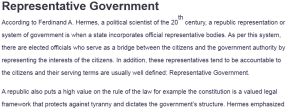Representative Government
According to Ferdinand A. Hermes, a political scientist of the 20th century, a republic representation or system of government is when a state incorporates official representative bodies. As per this system, there are elected officials who serve as a bridge between the citizens and the government authority by representing the interests of the citizens. In addition, these representatives tend to be accountable to the citizens and their serving terms are usually well defined: Representative Government.
A republic also puts a high value on the rule of the law for example the constitution is a valued legal framework that protects against tyranny and dictates the government’s structure. Hermes emphasized that in a republic these representative bodies are crucial in promoting accountability, and stability and ensuring harmony between the interests of the citizens and the actions taken by the government.[1]. According to Polybius, a republic was a combination of monarchy, aristocracy, and democracy.
Democracy, on the other hand, is a government system that derives power from the citizens mainly through voting. It is sort of like the fulfillment of both the descriptive and substantive representation whereby in descriptive representation, which dictates that the deliberative bodies of those in office should be a reflection of the demographics of those they represent, this creates room for minorities. Substantive representation, in addition, goes beyond one’s identity and dictates that a representative despite their background should represent the needs of their constituency.[2]. By doing this the representative under substantive representation champion the needs of the citizens even if they disagree with these needs. Essentially, a democracy is when a form of government ruled by the people.
Polybius, a Greek historian who lived in the 2nd century BCE determined that one of the main reasons Rome became a successful empire within half a century is because it had a government made up of mixed representations including monarch, aristocracy, and democracy. The reason Polybius said that Rome was partially democratic was because it allowed the participation of citizens in various processes like decision making for example regarding war, and citizens were allowed to determine who governed them through elections.[3].
In addition, citizens would hold public assemblies where they vote on laws, and elect officials, among other things. While I agree with Polybius that Rome did involve its citizens in governing, the process was highly exclusive, and women, noncitizens, slaves, and people in lower classes, had no say in it as they were excluded. Due to this reason, I disagree that the government was democratic.
Bibliography
Binetti, Christopher. “Sprouts of the ancients: The ancient roots of representation in the Greater Mediterranean region from the Hittites to Rome.” Geopolitics, History, and International Relations 9, no. 2 (2017): 174-198.
Polybius. The Histories. Translated by William Roger Paton. In LacusCurtius: Into the Roman World, edited by Bill Thayer. University of Chicago. Accessed [14/11/2024]. https://penelope.uchicago.edu/Thayer/E/Roman/Texts/Polybius/6*.html.
[1] Binetti, Christopher. “Sprouts of the ancients: The ancient roots of representation in the Greater Mediterranean region from the Hittites to Rome.” Geopolitics, History, and International Relations 9, no. 2 (2017): 174-198.
[2]Christopher. “Sprouts of the ancients: The ancient roots of representation in the Greater Mediterranean region from the Hittites to Rome.” 174-198.
[3] Polybius. The Histories. Translated by William Roger Paton. In LacusCurtius: Into the Roman World, edited by Bill Thayer. University of Chicago.
ORDER A PLAGIARISM-FREE PAPER HERE
We’ll write everything from scratch
Question 
So far, we have practiced reading historical documents (primary sources) and modern academic articles (secondary sources). In this assignment, you are going to practice using both types of sources to construct a full essay.
This week, you were assigned two readings that relate to the form of government known as a “republic,” an ancient writing by the Greek historian, Polybius, and an article by a modern historian, Christopher Binetti. For this week’s essay, I want you answer the following questions using evidence from the readings, textbook, and/or lectures:
First, what is a democracy and what is a republic? Why did Polybius say that Ancient Rome was partially ‘democratic’ and do you agree with him?

Representative Government
Second, according to Binetti, which ancient civilizations (before the Romans) were most important in introducing ideas of republicanism and representative government?
Third, if the Roman Republican system was so ingenious, why did it devolve into a system more like a dictatorship or monarchy? What long and short term threats brought down the Republic?
Notes:
- THESE ARE THE READINGS to answer the questions only use readings provided and PDF that was uploaded.